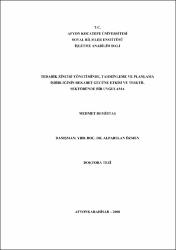Tedarik zinciri yönetiminde, tahminleme ve planlama işbirliğinin rekabet gücüne etkisi ve tesktil sektöründe bir uygulama
Citation
Demirtaş Mehmet ‘’Tedarik Zinciri Yönetiminde, Tahminleme Ve Planlama İşbirliğinin Rekabet Gücüne Etkisi Ve Tesktil Sektöründe Bir Uygulama’’ ‘’In The Supply Chain Management, The Effect Of Cooperation For Forecasting And Planning On The Competative Power And A Practice To The Textile Sector’’Afyon Kocatepe Üniversitesi Afyonkarahisar 2008Abstract
Bu çalışmada Tekstil sektöründe faaliyet gösteren işletmelerin Tedarik Zinciri Yönetiminde tahminleme ve planlama işbirliğinin işletmelerin rekabet gücüne etkisi araştırılmıştır. Bu amaçla öncelikle ankete katılan işletmelerin genel profilleri belirlenmiştir. İşletmelerin genel profilleri ile Tedarik zinciri Yönetimi uygulamalarında ve beklenen avantajlarda anlamlı farklılıklar araştırılmıştır. Daha sonra, tahminleme ve planlama işbirliğinin işletmelerin rekabet gücü üzerindeki etkisinin olup olmadığı belirlenmeye çalışılmıştır.
Bu amaçla Denizli yöresi tekstil sektöründe faaliyet gösteren işletmelere anket uygulanmıştır. Bu araştırmada, işletmelerin genel profili ile TZY uygulamaları ve TZY avantajları arasında anlamlı farklılık olup olmadığı öncelikle araştırılmış daha sonra “planlama, planlama işbirliği, tahminleme ve tahminleme işbirliği” yapan işletmelerin yapmayan işletmelere göre rekabet güçlerinde farklılık olup olmadığı test edilmiştir.
Araştırmada, işletmelerin genel profiline göre TZY uygulamalarında, 16 değişkene göre yapılan analizde, anlamlılık açısından büyükten küçüğe sıralandığında, kapasite kullanım oranı, personel sayısı, ihracat yapması ve üretim konularına göre farklılık görülmüştür.
İşletmelerin genel profili farklı işletmelerin tedarik zincirinden beklediği avantajlar açısından kapasite kullanım oranı ile anlamlı ilişki vardır. Personel sayısı ve ihracat yapma 3 değişkenle eşit oranda ilişki ve en az değişkenle son sırada üretim konularına görE anlamlı ilişkiye rastlanmıştır.
Rekabet gücüne göre değerlendirmede sırası ile, planlama işbirliği, tahminleme, planlama ve tahminleme işbirliği arasında anlamlı ilişki bulunmuştur. İşletmelerin tedarik zinciri yönetiminin rekabet gücüne etkisi açısından planlama alanında işbirliğine gitmelerinin daha anlamlı olduğu sonucu çıkmıştır. In the study, In the textile sector, In the supply chain management, the co¬operation on forecasting and planning and its effect on the business entreprises’ competitive power was examined. For this objective, the enterprises which were placed in Denizli region were applied the questionnaire. Firstly, the enterprises’ profiles were determined. In the enterprises’ profiles, in the practices on the supply chain management, and in the expecting advantages, the meaningful differences were examined. Later, the research about the effect of the co-operation by forecasting and planning on the enterprises’ competitive power.
According to the enterprises’ general profiles, in the applications on SCM, in the analysis by the sixteen variables, by the proportions of capacity usage, the numbers of employees, the levels of exportation and the productions, the differences were found.
By the enterprises’ general profiles and the advantages of the SCM, the most significant difference, in turn, the proportion of capacity usage, the number of employees and the level of exportation equally, and the last, the subjects of the productions, the least significant difference were found.
According to the competitive power by significant difference, in the analyse the findings showed that there were significant differences between the co-operation of
planning, forecasting, the co-operation of planning and forecasting. As a result, by the effect of the supply chain management on the competitive power, the enterprises must co-operate with each other. By the significant difference, in turn, the planning-co- operation, forecasting, the planning-forecasting-co-operation were placed on.
As a result, for the enterprises which were studied in, they didn’t get the advantage of the competitive power which was obtained from the supply chain. In order to get the advantage of the supply chain, the enterprises must realize the transformation from the relationship of ordering to the one of forecasting and planning.
According to the findings, the enterprises which were studied, were mostly in the way of the ordering-relationships. So, the enterprises didn’t get the advantage of the competitive power which was brought by the supply chain.



















